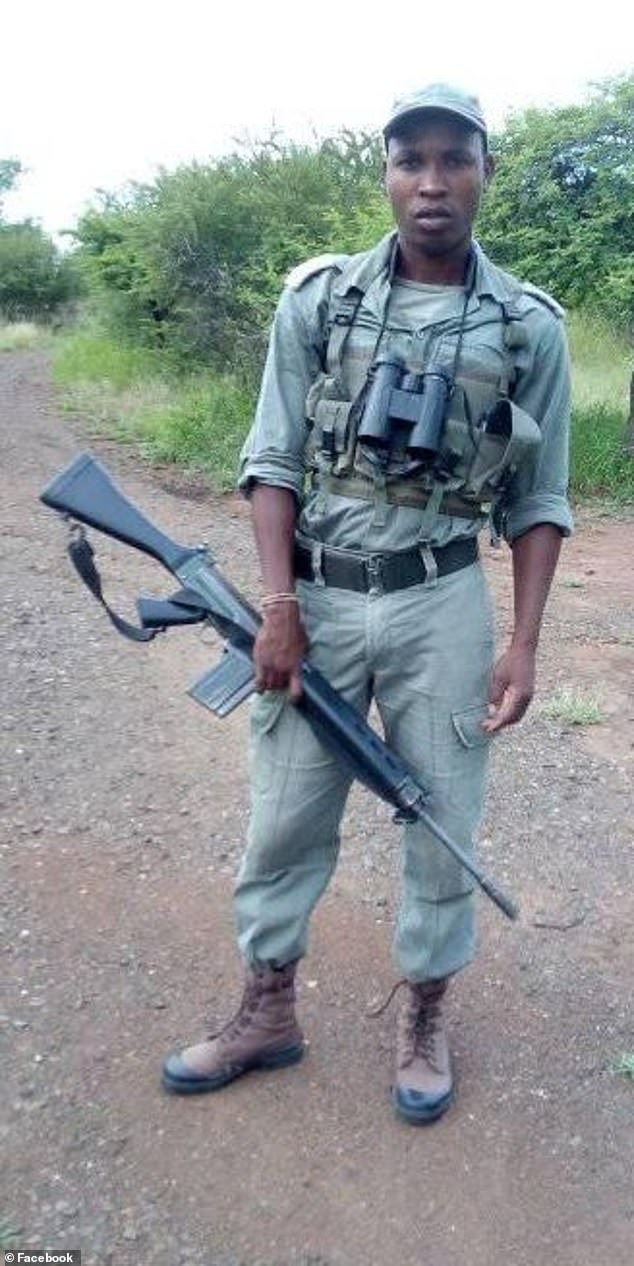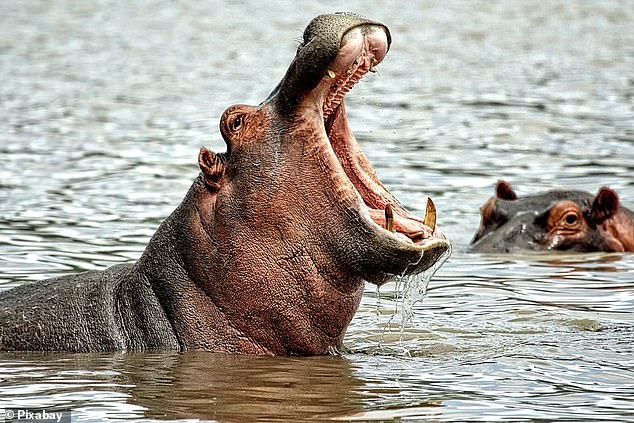Hippo crushes to death ranger who dedicated his life to protecting the animals from poachers in South Africa: Colleagues are forced to kill the animal in doomed bid to save him
- Sphamandla Mthembu, 31, was crushed to death in the jaws of a hippopotamus
- The ranger was hunting for poachers in a South African reserve in the dark
- He reportedly suffered nine penetrating wounds from the animal’s teeth
A brave ranger was crushed to death in the jaws of a rampaging hippo after ambushing a morning patrol along a riverbank in a nature reserve in South Africa.
Experienced patroller Sphamandla Mthembu, 31, was with three fellow rangers in the Mkhuze Game Reserve, 290 kilometers north of Durban, shortly after dawn to protect a herd of elephants and rhinos.
The victim and three colleagues followed a series of footprints, acting on a tip that poachers had entered the park after dark and split into two groups to surround them.
But the armed ranger accidentally surprised a three-ton hippo returning to the river and was immediately attacked by the beast, opening fire to save himself.
His gunfire brought his colleagues to the river path, where the ranger was caught in the hippo’s jaws, before opening fire themselves.
Local media reported that the ranger suffered nine gaping wounds to his body in the horrific attack in northern Zululand as the group hunted for poachers.
Experienced patrolman Sphamandla Mthembu (photo) was crushed to death by a rampaging hippo

Local media reported that he had nine penetrating wounds caused by the hippo’s teeth

Hippos are among the most aggressive animals in Africa and have the largest teeth of any land mammal
They did not stop firing their guns until the hippopotamus was dead, before moving forward to help their fatally wounded colleague.
But as they waited for emergency medical help, he died from the horrific crush and bite wounds the hippopotamus inflicted on the father-of-two, who had been a park ranger for eight years.
Shie Mkhize, the CEO of Ezemvelo Kwazulu-Natal Wildlife, which manages conservation and patrols in the Mkhuze Reserve, said: ‘My heart broke when I heard about the incident and finding the words to talk to his family was so difficult .
“It was made even more difficult when I was told that Mr Mthembu had recently lost a young child and his family was trying to cope when this unfortunate incident occurred.
“Our thoughts are also with his fellow rangers, who need space to process what they have seen,” he said.
South African police have opened an investigation into the attack that took place an hour after sunrise at 5.30am on Sunday when rangers were following poachers’ footprints near the Mkhuze River.
A game reserve worker told a local journalist: ‘It all happened very suddenly and the hippo came out of nowhere and attacked, trampling and biting the ranger who had opened fire.
“The others shot too, but by the time it was dead, so was the ranger. They said there was so much blood they didn’t know how he was still alive when they reached him.”
The 40,000 hectare Mkhuze Game Reserve is a UNESCO World Heritage Site and home to Africa’s famous Big Five animals, consisting of the elephant, rhino, buffalo, leopard and lion.
Hippos have the largest teeth of any land mammal, with their front teeth over a foot long and their canines up to 18 inches long.
Hippos kill more people than any other animal in Africa, claiming at least 3,000 victims a year, compared to elephants, which kill about 500, crocodiles 300 and lions about 200.
The enormous herbivores, which grow up to 3.5 meters long and more than 1.80 meters high, can reach speeds of up to 32 kilometers per hour and can easily catch a human.
They are known as the most crabby animal on the African continent.
Hippos will attack even large boats on the river, and become very irritated if people come between them and their young calves.
